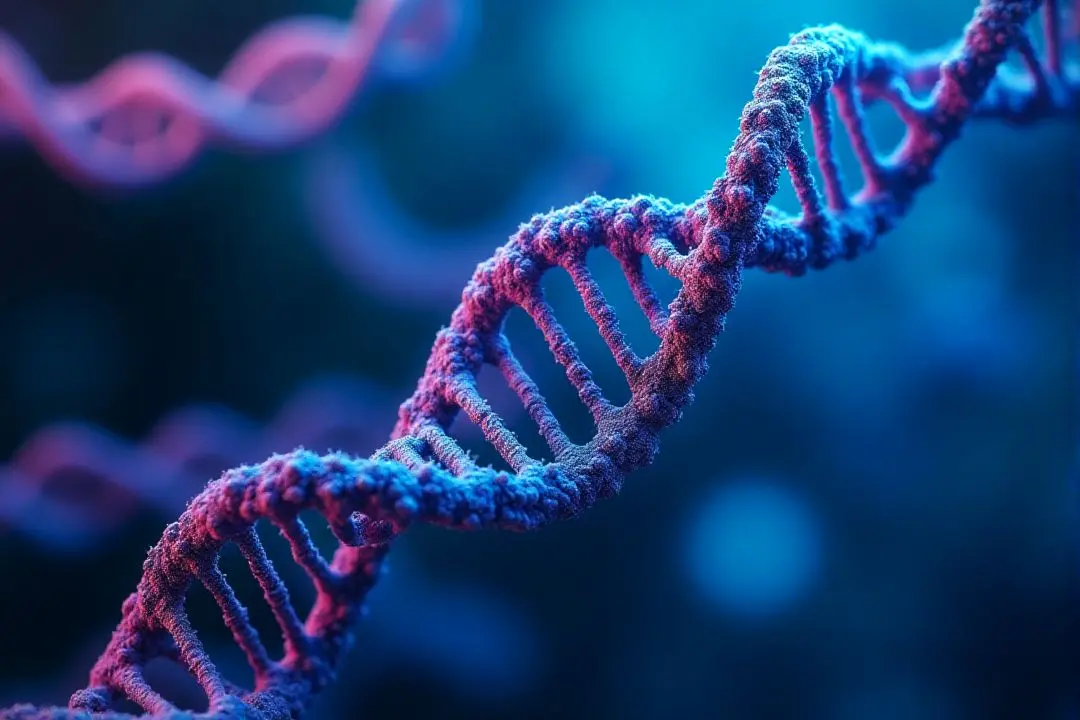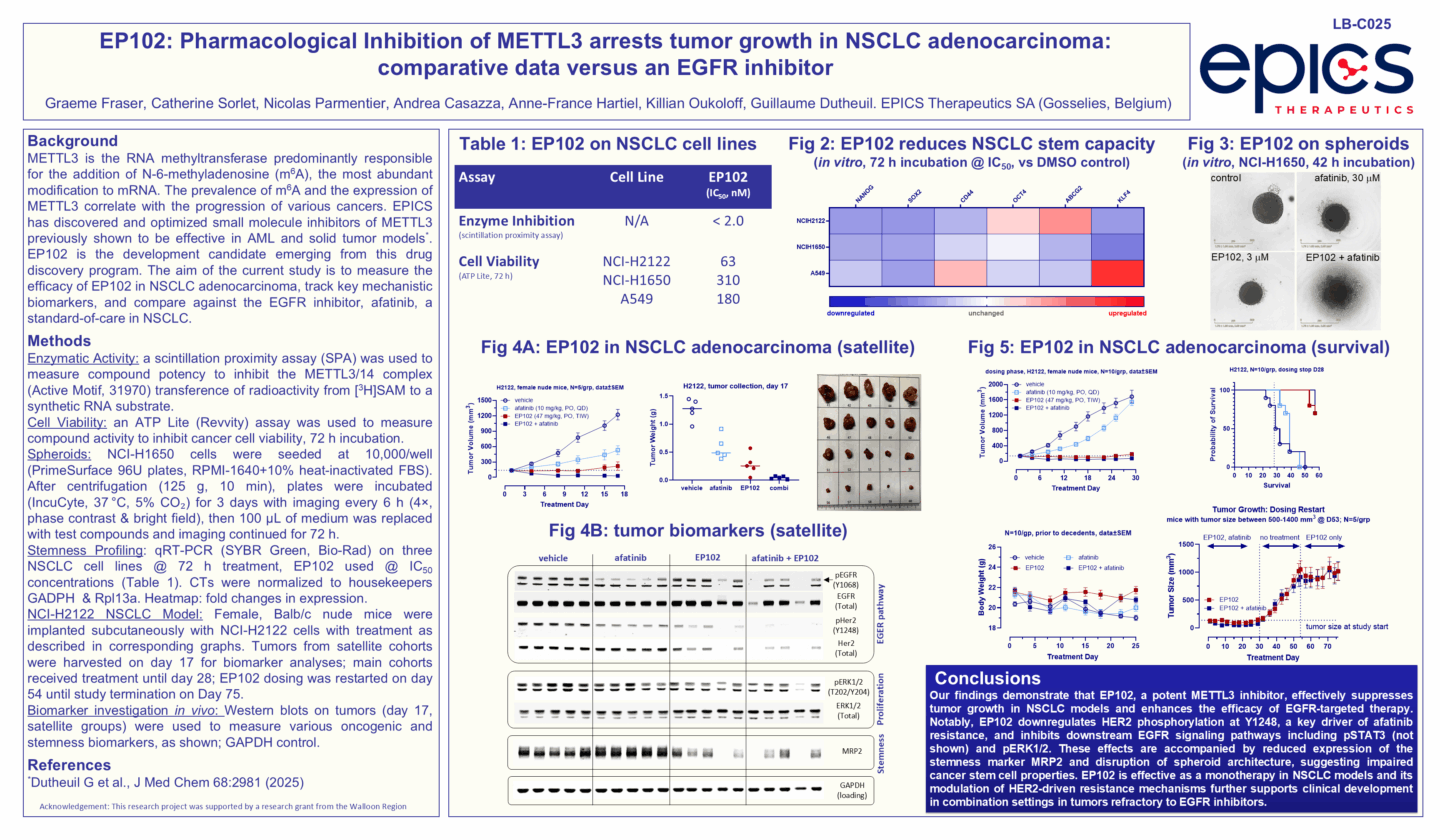EP102 monotherapy demonstrated tumor growth inhibition in preclinical NSCLC models, with efficacy outperforming that of afatinib (a drug approved for certain lung cancers) in a xenograft study*; associated biomarker analysis indicates potential for enhanced tumor control for EP102 in combination with EGFR inhibitors.
Gosselies, Belgium – October 22nd, 2025
EPICS Therapeutics announces that preclinical data on EP102, its proprietary METTL3* inhibitor development candidate, has been accepted for presentation at the AACR-NCI-EORTC International Conference on Molecular Targets and Cancer Therapeutics, taking place at the Hynes Convention Center in Boston, Massachusetts (October 22–26, 2025).
The abstract, titled “EP102: Pharmacological Inhibition of METTL3 arrests tumor growth in NSCLC adenocarcinoma; comparative data versus an EGFR inhibitor,” will be presented as a poster in the afternoon session on October 25th.
Highlights from the preclinical findings include:
● EP102 significantly inhibited tumor growth in models of NSCLC (non-small cell lung cancer, the most common type of lung cancer), with efficacy exceeding that of afatinib, an EGFR*-targeted therapy approved for the treatment of NSCLC.
● Treatment with EP102 significantly reduced the activation of HER2, STAT3, and ERK1/2, key effectors within the EGFR signaling cascade that drive tumor progression. These findings highlight a novel therapeutic strategy: targeting METTL3 to overcome resistance to EGFR inhibitors.
These results underscore the potential of METTL3 inhibition to overcome limitations of existing targeted therapies in NSCLC adenocarcinoma and position RNA epigenetic modulation as a therapeutic approach across multiple solid tumor types where significant unmet medical need remains.
“These findings lend support for the inclusion of patients with NSCLC adenocarcinoma in our ongoing clinical trial of EP102 in the treatment of selected solid tumors. We expect that EP102 will deliver treatment benefit to NSCLC patients underserved by current therapy” said Graeme Fraser, PhD, Chief Executive Officer of EPICS.
*A xenograft study is a type of preclinical experiment where researchers implant human cancer cells into mice to study how tumors grow and respond to treatment.
*METTL3 is the enzyme responsible for catalyzing N6-methyladenosine (m6A), the most abundant mRNA modification. m6A regulates cellular proliferation and lineage determination. In cancer, METTL3 is often overexpressed and, in addition, m6A is abundantly expressed in certain tumor types, consequently driving tumor growth and malignant cell survival.
*EGFR (epidermal growth factor receptor) is a protein on the surface of cells that promotes cell division and survival. Many cancers, including certain types of lung cancer, rely on EGFR signaling for growth; drugs such as afatinib act by blocking this pathway.
About EPICS Therapeutics
Epics Therapeutics is a clinical-stage Belgian, private, drug discovery and development company that invents and develops small molecule drugs targeting RNA epigenetics* and G-Protein Coupled Receptor* mechanisms involved in cancer development. By targeting these mechanisms, Epics Therapeutics aims to translate science into life-changing therapies for patients.
*RNA epigenetics refers to the post-genomic changes in protein synthesis directed by chemical marks added to RNA molecules, such as N6-methyladenosine (m6A). These marks do not change the genetic code itself, but they influence how the instructions in RNA are read and used to make proteins. In healthy cells, this helps regulate growth and differentiation. In cancer, these marks are applied in an aberrant manner, tipping the balance toward uncontrolled cell proliferation.
*G-protein coupled receptors are a large family of receptors expressed on the cell surface that respond to signals like hormones, neurotransmitters, or metabolites. When activated, they trigger G-proteins in the cell membrane to transduce signals inside the cell that affect how the cell behaves with application to a broad range of physiological outputs, including in the field of cancer.
For more information, visit www.epicstherapeutics.com
Contact: EPICS Therapeutics Media Relations Desk at media_relations@epicstx.com



